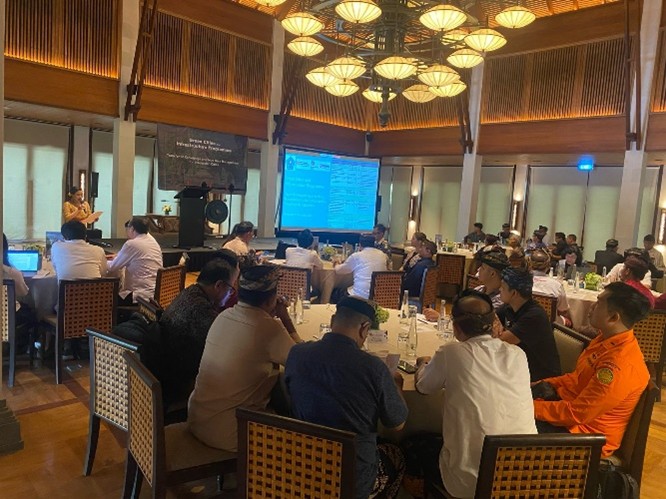- GCIP hosted knowledge transfer workshops in Surabaya and Denpasar, bringing together local and international experts to enhance flood risk management strategies.
- Discussions focused on improving early warning systems, leveraging digital solutions and ensuring inclusive flood resilience planning.
- Insights from these workshops will shape future capacity-building initiatives, including piloting innovative flood forecasting models and strengthening disaster preparedness in Surabaya and Denpasar.

Key stakeholders discuss flood risk management strategies in Denpasar.
The Green Cities and Infrastructure Programme (GCIP) successfully conducted two knowledge transfer workshops on flood risk management, strengthening flood resilience efforts in Surabaya and Denpasar, Indonesia. Held on 11 February in Surabaya, and 13 February in Denpasar, the workshops brought together local flood management experts, international specialists and city officials to discuss cutting-edge solutions for flood preparedness and response.
A key highlight was the participation of international experts in flood risk management and digital solutions, who joined remotely to present best practices and engage in discussions with local stakeholders.
Both workshops followed a structured format designed to facilitate knowledge exchange and foster collaboration. Sessions included:
- Knowledge sharing: presenting the Bangkok Flood Management Decision Support System, demonstrating how data-driven solutions can enhance flood resilience.
- Local insights: discussing the current flood management strategies as presented by city leaders, with a particular focus on early warning systems and response measures.
- Strategic discussions: exploring city-specific priorities for improving flood preparedness, identifying key challenges and opportunities for enhancing digital solutions and community-based approaches.
- Social and economic impact analysis: examining the wider effects of flooding, particularly on vulnerable communities, ensuring that future strategies remain inclusive and equitable.
The workshops played a crucial role in strengthening flood resilience by facilitating knowledge transfer between international experts and local stakeholders. Discussions on enhancing early warning systems provided a strong foundation for improving disaster preparedness in both cities.
“Enhancing flood risk management through collaboration and knowledge-sharing is essential to building resilient cities.”
Moving forward, insights from these workshops will inform future capacity-building initiatives aimed at:
- Piloting innovative flood forecasting models.
- Advancing early warning systems.
- Developing inclusive, data-driven flood risk management frameworks.
GCIP remains committed to supporting Surabaya and Denpasar in developing technology- and data-driven, community-focused flood resilience strategies. Future initiatives can focus on piloting innovative flood forecasting models, enhancing early warning systems and ensuring that flood management is inclusive and responsive to the needs of all residents. Through continued engagement and knowledge-sharing, GCIP aims to enhance flood resilience and safeguard communities from the increasing risks posed by climate change.
The UK’s Green Cities and Infrastructure Programme is tackling climate change and extreme poverty by accelerating the delivery of sustainable green cities and climate-resilient infrastructure.
Published
07/03/25
